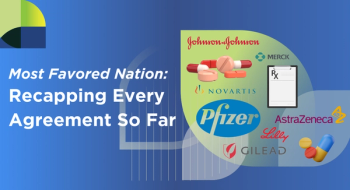
Pharmacy Week in Review: FDA Approves Smallpox Treatment, Valsartan Recalled
A look at last week's top stories in the world of pharmacy.
A look at last week's top stories in the world of pharmacy.
Transcript
Nicole Grassano, Host: Hello and welcome to the Pharmacy Times News Network. I’m Nicole Grassano your host for our Pharmacy Week in Review.
Officials with the US FDA are alerting health care professionals and patients of a voluntary recall of several, but not all, drug products containing the active ingredient valsartan, due to an impurity, NDMA, which was found in the recalled products, according to a report on Pharmacy Times.com.
NDMA is classified as a probable human carcinogen based on results from laboratory tests. The presence of NDMA was unexpected and is thought to be related to changes in the way the active substance was manufactured. Some companies are recalling all lots of non-expired products that contain the ingredient valsartan supplied by a third-party. Not all valsartan-containing medicines distributed in the United States have the valsartan active pharmaceutical ingredient supplied by this specific company. The supplier has stopped distributing its valsartan API and the FDA is working with the affected companies to reduce or eliminate the valsartan API impurity from future products.
High school athletes are more likely to sustain a concussion than adult athletes, and they typically take longer to recover as well. This vulnerability creates an increased concern around head injuries for children and teenagers who are physically active, according to a report on Contemporary Clinic.com.
Yet despite the known detrimental impacts that concussions have, particularly on young brains, rates of concussions are often underreported, according to officials from the CDC. This underreporting recently prompted CDC researchers to analyze data from the 2017 national Youth Risk Behavior Survey (YRBS) to examine the prevalence of concussions in high school students, which noted that 15.1% of students reported having a concussion as a result of physical activity in the previous year. The numbers prompted CDC officials to encourage health care providers to remain aware of the signs of concussion in younger patients during examinations.
Officials with the FDA have approved tecovirimat (TPOXX, SIGA), the first drug with an indication for the treatment of smallpox, to boost preparedness in the event of a bioterror attack, according to a report on Specialty Pharmacy Times.
Although eradicated in 1980 due to vaccination efforts, there have been concerns of the virus being used as a potential weapon in bioterrorism. The FDA approval is based on data from studies conducted in animals infected with viruses that are closely related to the virus that causes smallpox.
The drug’s efficacy was based on measuring survival at the end of the study. According to the data, more animals treated with tecovirimat survived compared with animals treated with a placebo. As a result, the drug was approved under the FDA’s Animal Rule, which allows the efficacy findings to support an FDA approval when it is not feasible or ethical to conduct trials in humans.
It’s mid July, and that means pharmacists may be getting more questions from their customers about sun safety. An educational video from FDA.gov aims to educate people about sunscreen awareness, urging viewers to use broad spectrum sunscreen with an SPF of at least 15. The video, titled Sunscreen Basics: SPF, Broad Spectrum, Water Resistance is available on the FDA's Youtube page.
For more great coverage and practical information for today’s pharmacist, visit our website and sign up for our Daily eNews. And don’t forget to follow us on Facebook, Twitter, and Instagram.
Thanks for watching our Pharmacy Week in Review. I’m Nicole Grassano at the Pharmacy Times News Network.
Newsletter
Stay informed on drug updates, treatment guidelines, and pharmacy practice trends—subscribe to Pharmacy Times for weekly clinical insights.


























